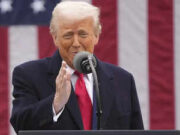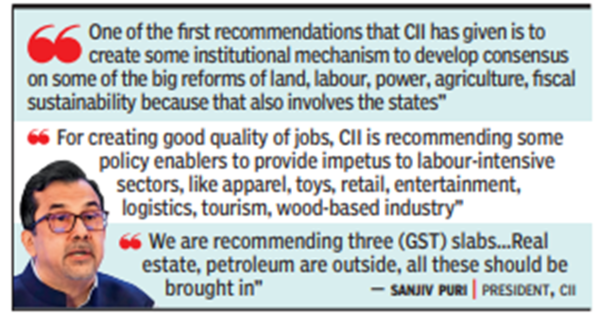
How is a coalition govt at the Centre going to impact policymaking?
A number of policy instruments have been used in the past, while following a model of inclusive growth within the fiscal glide path and dealing with energy transition. The outcome is before us, the economy grew 8.2% last year. The economy is in robust health, that’s really shows the strategy of investment-led inclusive growth is directionally right, because it creates a virtuous cycle and enhances the productive capacity. That should energise more reforms. One of the first recommendations that CII has given is to create some institutional mechanism to develop consensus on some of the big reforms of land, labour, power, agriculture, fiscal sustainability because that also involves the states.
What are the stumbling blocks that you want govt to remove to accelerate job creation?
Job creation is also a responsibility of the private sector, govt mainly has to put the enablers in place. Private capex is on the right trajectory. In FY22-23, it was at 23.8% of GDP, which is higher than what it was pre-Covid and had dropped to 20.7% of GDP in 2021. There are several sectors where investments are coming, sectors related to infrastructure, cement and steel, sectors which have received impetus PLI like electronics, food processing, telecom, pharma, logistics, renewable energy, automobiles, EVs, semiconductors. On the issue of jobs – it’s about jobs and also the quality of jobs. For creating good quality of jobs, CII is recommending some policy enablers to provide impetus to labour-intensive sectors, like apparel, toys, retail, media, entertainment, logistics, tourism, wood-based industry. There are so many areas where the employment to capital ratio is very favourable. So, we’re recommending employment-linked incentives for these sectors, with some outcome metrics.
The second important thing is to provide impetus to MSMEs, which create a lot of employment and there is larger integration into global value chains. The journey has started because the world also is looking at supply chain diversification. So, free trade agreements provide some impetus to this. Human capital development and social infrastructure is important. We have recommended increasing the investment in education to 6% of GDP and for healthcare to 3%. What is also important is to create a vibrant rural economy. The first piece that has to be solved is agriculture, both from a productivity perspective plus also resilience because weather events are only going to multiply. The second is to empower the youth in rural areas to be able to participate in other opportunities in the economy.
There has been a lot of debate around inequality and there have been suggestions about taxing the super rich to raise resources. What is your view?
The most important facet is really about continuing to create the virtuous cycle of employment consumption, investment and creating good quality jobs. Improving farm incomes, that’s the most important area to focus on. As far as specifically direct tax is concerned, it’s more about getting more people within the tax system, and not resorting to, as some have suggested, taxing the so-called super rich, or (imposing) wealth tax and things like that. The focus right now has to be on creating an economy that creates a lot of jobs, that’s ultimately where the solution is going to live. The second is expanding the (tax) base.
How complex do you find GST in terms of number of slabs, classification issues? What changes would you want?
We are recommending three slabs. In addition to that, we are also saying it should be more inclusive. Real estate, petroleum are outside, all these should be brought in. There is room for process simplification, which is an ongoing exercise.









































